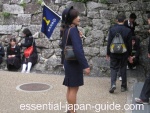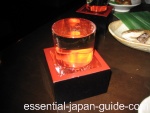Important Japanese Customs
Japanese customs can seem quite overwhelming if not flat out incomprehensible to first time travelers, but because the Japanese place a great emphasis on politeness and formality, gaining familiarity with the most important of Japan’s customs and rules of etiquette prior to your travels will go a long way toward endearing yourself to your hosts and making your stay in Japan more rewarding.
While on one hand most Japanese may not expect foreigners to be familiar with their customs, every culture has certain accepted ways of doing things that are taken for granted as natural, and Japan is no exception.
By following basic Japan customs and doing as the Japanese do, you’ll not only demonstrate your appreciation and respect for the country in which you’re a guest, you’ll likely impress your hosts with your refined sense of manners as well!
![]()
Important Japan Customs to Follow
While you need not follow every single custom while in Japan or interacting with Japanese, there are several important Japanese customs and rules of etiquette that you should make every effort to abide by when in Japan.
 Removing shoes: The custom of removing shoes while indoors is commonplace in many situations in Japan, such as when entering a home.
Removing shoes: The custom of removing shoes while indoors is commonplace in many situations in Japan, such as when entering a home.
Learn more about removing shoes in Japan.
 Bathing: Japanese bathing etiquette may be somewhat different than what you are used to home. There are a number of important essential rules of bathing in Japan that you should be familiar with
Bathing: Japanese bathing etiquette may be somewhat different than what you are used to home. There are a number of important essential rules of bathing in Japan that you should be familiar with
Learn more about bathing in Japan.
 Gift giving: There are many situations in which it is considered polite and proper to bring little gifts, called omiyage in Japanese.
Gift giving: There are many situations in which it is considered polite and proper to bring little gifts, called omiyage in Japanese.
Learn about the important Japanese custom of gift giving.
 Bowing: Bowing is another way that Japanese express politeness in social interactions. The intricacies of bowing are quite complex, and although as a foreign visitor you won’t be expected to perform this custom perfectly, some familiarity with the custom of bowing in Japan will go a long way toward smoothing your own interactions with your Japanese counterparts.
Bowing: Bowing is another way that Japanese express politeness in social interactions. The intricacies of bowing are quite complex, and although as a foreign visitor you won’t be expected to perform this custom perfectly, some familiarity with the custom of bowing in Japan will go a long way toward smoothing your own interactions with your Japanese counterparts.
Learn about Japan’s important custom of bowing.

 Business Etiquette: You’ll notice that everyone from school children to elevator girls wears uniforms in Japan. Although things are loosening up a little bit, err on the side of formality when dressing for business.
Business Etiquette: You’ll notice that everyone from school children to elevator girls wears uniforms in Japan. Although things are loosening up a little bit, err on the side of formality when dressing for business.
Learn more about Japanese business etiquette.

 Eating and Drinking: When you’re out at a bar or restaurant drinking beer or sake (which in Japanese is actually called “nihon-shu”) with Japanese friends or business associates, it is customary for drinking companions to pour drinks for one another. So never let your drinking partner pour his or her own drink. If you see their glass getting empty, simply grab the bottle and offer to pour. Likewise, it is bad Japanese manners to pour your own drink. Your Japanese companion will notice your empty glass and offer to pour for you.
Eating and Drinking: When you’re out at a bar or restaurant drinking beer or sake (which in Japanese is actually called “nihon-shu”) with Japanese friends or business associates, it is customary for drinking companions to pour drinks for one another. So never let your drinking partner pour his or her own drink. If you see their glass getting empty, simply grab the bottle and offer to pour. Likewise, it is bad Japanese manners to pour your own drink. Your Japanese companion will notice your empty glass and offer to pour for you.
Learn more about Japanese manners involving eating and drinking.
 Other Japanese Mannerisms: Japanese culture has many other unique manners and mannerisms related to all aspects of daily life, including interpersonal communication, physical affection, apologizing, refusing, and many other areas.
Other Japanese Mannerisms: Japanese culture has many other unique manners and mannerisms related to all aspects of daily life, including interpersonal communication, physical affection, apologizing, refusing, and many other areas.
Learn about more Japanese mannerisms.
![]()
